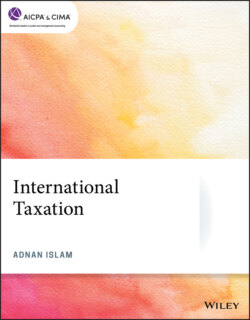Читать книгу International Taxation - Adnan Islam - Страница 83
Interest income
ОглавлениеThe term interest includes any payment for the use of borrowed funds, including unstated interest that is part of a deferred payment on the sale of property and original issue discount. Any payment of interest by the U.S. government, a U.S. territory, or any subdivision of a U.S. territory (not including U.S. possessions) is U.S.-source income. Note that the source of interest does not depend on such factors as where funds are borrowed or spent, the place where principal is paid, or the place where a debt obligation is issued.
In general, the source of interest income is determined by the residence of the debtor.
Sections 861(a)(1) and 862(a)(1) generally source interest income by reference to the debtor’s residence (in the case of a “noncorporate” debtor, such as an individual, partnership, trust, or estate) or the debtor’s place of incorporation (in the case of a corporation). The general rule of Sections 861(a)(1) and 862(a)(1) treats interest income as U.S.-source income if the debtor is a U.S. resident or a domestic corporation, and as foreign-source income if the debtor is neither a U.S. resident nor a domestic corporation.
Generally, U.S. source interest income includes the following items:
Interest on bonds, notes, or other interest-bearing obligations of U.S. residents or domestic corporations
Interest paid by a domestic or foreign partnership or foreign corporation engaged in a U.S. trade or business at any time during the tax year
Original issue discount
Interest from a state, the District of Columbia, or the U.S. government
The place or manner of payment is immaterial in determining the source of the income.
A substitute interest payment made to the transferor of a security in a securities lending transaction or a sale-repurchase transaction is sourced in the same manner as the interest on the transferred security.
U.S. source interest income does not include the following items:
1 Interest paid by a resident alien or a domestic corporation on obligations issued before August 10, 2010, if for the three-year period ending with the close of the payer’s tax year preceding the interest payment, at least 80% of the payer’s total gross income:Is from sources outside the United States, andIs attributable to the active conduct of a trade or business by the individual or corporation in a foreign country or a U.S. possession.However, the interest will be considered U.S. source interest income if either of the following apply.The recipient of the interest is related to the resident alien or domestic corporation. See Section 954(d)(3) for the definition of related person.The terms of the obligation are significantly modified after August 9, 2010. Any extension of the term of the obligation is considered a significant modification.
2 Interest paid by a foreign branch of a domestic corporation or a domestic partnership on deposits or withdrawable accounts with mutual savings banks, cooperative banks, credit unions, domestic building and loan associations, and other savings institutions chartered and supervised as savings and loan or similar associations under federal or state law if the interest paid or credited can be deducted by the association.
3 Interest on deposits with a foreign branch of a domestic corporation or domestic partnership, but only if the branch is in the commercial banking business.
